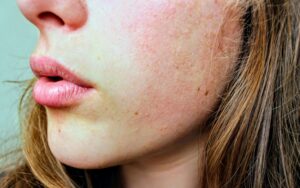Coping Strategies and Skincare Tips

In the fast-paced world we live in, stress has become an unavoidable companion in our daily lives. While the impact of stress on mental health is well-known, its effects on our skin are often overlooked. From breakouts to premature aging, stress can manifest itself in various ways, taking a toll on our skin’s health and appearance. In this beauty blog, we’ll explore the intricate relationship between stress and skin, shedding light on the underlying mechanisms, and offering coping strategies and skincare tips to help you achieve a radiant complexion even in the face of life’s challenges.
Understanding the Stress-Skin Connection
- Cortisol and Inflammation:
When we experience stress, our bodies release cortisol, often referred to as the “stress hormone.” Elevated cortisol levels can lead to increased inflammation in the body, triggering various skin issues. Conditions like acne, eczema, and psoriasis may worsen or flare up in response to chronic stress.
- Breakouts and Acne:
Stress-induced hormonal fluctuations can stimulate the sebaceous glands to produce more oil, leading to clogged pores and increased acne breakouts. The inflammatory response also exacerbates existing acne lesions, making it a common concern for individuals dealing with chronic stress.
- Premature Aging:
Chronic stress has been linked to accelerated aging of the skin. The increased production of free radicals and the breakdown of collagen and elastin fibers contribute to the development of fine lines, wrinkles, and a loss of skin elasticity. Over time, this can result in a prematurely aged appearance.
- Impaired Skin Barrier Function:
Stress can compromise the skin’s natural barrier function, making it more susceptible to external irritants and environmental damage. This weakening of the skin barrier can lead to increased sensitivity, redness, and a heightened risk of skin conditions like dermatitis.
- Skin Dehydration:
Stress can contribute to dehydration, impacting the skin’s moisture levels. Dry and dehydrated skin is more prone to irritation and may appear dull and lackluster. In severe cases, chronic stress can even exacerbate conditions like eczema, causing intense itching and discomfort.
Coping Strategies for Stress
- Mindfulness and Relaxation Techniques:
Incorporate mindfulness practices, such as meditation, deep breathing exercises, or yoga, into your daily routine. These techniques can help reduce stress levels, promote relaxation, and positively impact both mental well-being and skin health.
- Regular Exercise:
Engage in regular physical activity to release endorphins, the body’s natural mood lifters. Exercise also improves circulation, which benefits the skin by promoting nutrient delivery and enhancing the removal of toxins.
- Adequate Sleep:
Prioritize quality sleep to allow your body and skin to regenerate. Lack of sleep can contribute to increased stress levels and may manifest on the skin as dark circles, dullness, and an overall tired appearance.
- Healthy Nutrition:
Consume a balanced and nutrient-rich diet. Antioxidant-rich foods, such as fruits and vegetables, can help combat oxidative stress and support skin health. Stay hydrated by drinking an ample amount of water to maintain skin elasticity.
- Establish Boundaries:
Set realistic expectations and boundaries to manage daily stressors. Learning to say no when necessary and finding a healthy work-life balance can significantly reduce chronic stress and its impact on both mental and skin health.
- Social Connections:
Maintain social connections and seek support from friends, family, or a support network. Positive social interactions can act as a buffer against stress, promoting emotional well-being and, consequently, healthier skin.
- Mindful Skincare Rituals:
Transform your skincare routine into a mindful self-care ritual. Take the time to pamper your skin with products that cater to its specific needs. This not only nurtures your skin but also provides a moment of relaxation in your day.
Skincare Tips to Counteract Stress Effects
- Gentle Cleansing:
Use a mild, hydrating cleanser to wash your face. Harsh cleansers can strip the skin of its natural oils, exacerbating dryness and sensitivity. Look for cleansers with soothing ingredients like chamomile or aloe vera.
- Hydration is Key:
Keep your skin well-hydrated by using a moisturizer suitable for your skin type. Hydration helps maintain the skin barrier, preventing moisture loss and reducing the risk of irritation. Consider incorporating hyaluronic acid for an extra boost of hydration.
- Antioxidant Protection:
Include antioxidant-rich products in your skincare routine to counteract the effects of oxidative stress. Vitamin C serums or creams can help protect the skin from free radical damage and promote a brighter complexion.
- Retinoids for Renewal:
Consider incorporating retinoids into your routine to stimulate collagen production and promote skin renewal. These compounds can help address signs of premature aging, such as fine lines and uneven skin tone.
- Calming Ingredients:
Seek out skincare products with calming ingredients like chamomile, calendula, or green tea extract. These ingredients have anti-inflammatory properties that can soothe stressed skin and reduce redness.
- Sun Protection:
Use a broad-spectrum sunscreen with at least SPF 30 daily to protect your skin from the harmful effects of UV radiation. Sunscreen is crucial for preventing further damage and maintaining healthy skin.
- Exfoliate Mindfully:
While exfoliation is beneficial for removing dead skin cells, be mindful of over-exfoliating, especially during stressful periods. Choose gentle exfoliants and limit use to 1-2 times per week to avoid irritation.

Tailoring Your Skincare Routine to Stress Levels
- Low Stress Days:
On days when stress levels are low, focus on a complete skincare routine that includes cleansing, toning, serums, and moisturizing. Use targeted treatments based on your skin concerns.
- Moderate Stress Days:
Simplify your routine on moderately stressful days. Stick to the essentials – cleanse, moisturize, and apply sunscreen. Consider incorporating calming ingredients to address any signs of irritation.
- High Stress Days:
On high-stress days, opt for minimalistic skincare. Stick to gentle cleansing, hydration, and sun protection. Avoid introducing new products or potent actives that may further stress the skin.
Understanding the intricate connection between stress and skin is the first step toward achieving a healthier complexion. By adopting coping strategies, prioritizing self-care, and tailoring your skincare routine to your stress levels, you can mitigate the impact of stress on your skin. Embrace a holistic approach to well-being that not only addresses the external factors affecting your skin but also nurtures your mental and emotional health. With mindful practices and a skincare routine customized for your needs, you can face stress head-on while maintaining a radiant and resilient complexion.




